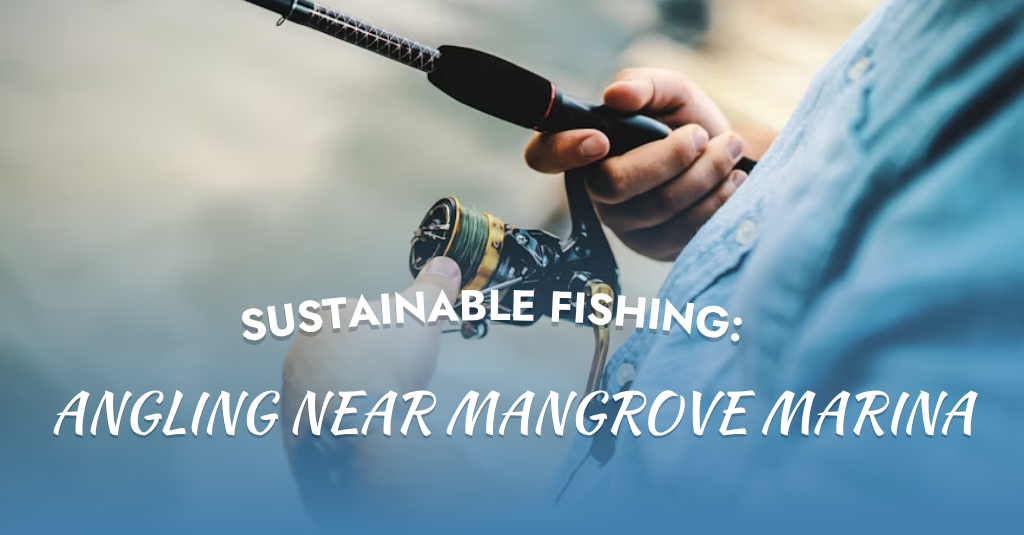
Sustainable Fishing: Angling Near Mangrove Marina
Fishing in the Florida Keys is not just a hobby; it’s a way of life. The Mangrove Marina waterfront is your gateway to a vibrant, fish-filled community, complete with coral formations and seagrass meadows. But popularity has its duties. To ensure this paradise continues, anglers need to adopt sustainable fishing practices that allow recreation and marine conservation to coexist.
Weekend visitors and old-timers alike, here’s how to catch the thrill of the catch while protecting the future of the fishery.
Why Sustainable Fishing Matters
The marine environment in the Florida Keys is fragile. Overfishing, habitat loss, and pollution can endanger its balance if left unattended. Sustainable fishing means:
- Fish stocks are healthy for our sons and daughters to enjoy their fishing traditions.
- We should all be able to agree that future generations deserve a healthy ocean for us to think about how fish stocks should be managed, based on our knowledge of nature
- Vulnerable habitats (coral reefs, seagrasses, etc.) are shielded.
- Sports remain vibrant without undermining biodiversity.
By upholding responsible angling practices, the pleasure of fishing and the water quality around Mangrove Marina are protected.
Vulnerable Fish Species Near the Keys
Not all fish are equally hardy. Some species are especially vulnerable to pressure from recreational fishing.
- Grouper species (including Nassau grouper) are slow-growing and susceptible to overfishing.
- Snapper species must be tightly managed to prevent them from becoming unbalanced.
- Tarpon and bonefish are valuable sport fish that have strong conservation programs.
- Sharks and rays are apex predators that maintain ecosystem stability.
Knowing which species are most vulnerable helps anglers focus on fish species protection while enjoying the sport responsibly.
Gear and Methods That Reduce Bycatch
Unintentional catches, fish or creatures pulled up alongside what fishermen intend to harvest, threaten marine life while squandering potential food. Selecting appropriate equipment aids efforts to keep sustainable fishing long-term.
Low-Impact Fishing Methods
- Fish tossed back into the water fare better when caught on circle hooks – they don’t get hurt as much.
- Hooks without barbs speed up release, protecting fish.
- Tools help get hooks out so fish aren’t hurt.
- Keeping your fishing line strong means battles don’t drag on, sparing fish needless weariness.
These methods not only improve catch & release success but also reflect Keys fishing ethics that emphasize respect for marine life.
Best Practices for Catch & Release
People who are fishing in the Florida Keys often put their catches back, hoping to help protect fish populations even as they have fun. But if not done carefully, this practice can actually lower a fish’s chances of living.
Responsible Catch & Release Steps
- To move fish without harm, either dampen your hands first or employ a gentle net.
- Don’t let the fish sit out in the air; keep it wet.
- Hold the creature’s frame, don’t yank on its mouth or breathing slits.
- Get the fish back into the water, supporting it gently till its fins kick in and it darts off on its own.
Florida Keys Marine Regulations
To stop fish populations from crashing, Florida wildlife officials have firm rules for fishing. People angling around Mangrove Marina need to know:
- You can only keep a certain number of fish – grouper, snapper, lobster, for instance – also there are rules about how big they need to be.
- To let fish reproduce, fishing is prohibited at certain times.
- Certain fish – Goliath grouper, for instance – are completely off-limits; you can’t take them.
- Areas where fishing is prohibited – marine parks, safeguarded ocean regions.
To keep fishing in the Florida Keys legal – while also helping protect its resources – it’s vital to know the rules.
Angler Participation in Conservation Programs
Sustainability doesn’t end with following the rules. Anglers can actively contribute to marine conservation efforts.
- Join citizen science projects that record catch data.
- Support habitat restoration programs like mangrove planting.
- Respect no-wake zones to protect seagrass beds.
- Educate fellow anglers on the importance of ethical fishing.
Getting involved helps strengthen community ties and ensures the tradition of sustainable fishing continues to thrive.
Conclusion
Fishing in Mangrove Marina for Mangrove is an amazing experience, but with that comes a responsibility. With good catch & release techniques and a dedication to the protection of the fish species with sustainable fishing, each outing on the water is joined to a greater cause in safeguarding marine life for the generations to come.
Sustainable Fishing at Mangrove Marina
Mangrove Marina offers an ideal base for anglers who care about the environment. By practicing responsible angling, following marine regulations, and adopting Keys fishing ethics, visitors can enjoy rewarding fishing trips while helping safeguard the future of the Keys’ marine life.
FAQs
What is the golden rule of sustainable fishing in the Keys?
Abide by Florida’s bag limits, size limits, and no-fishing areas to help ensure fish populations are protected.
What type of fishing tackle best promotes responsible angling?
Circle hooks and barbless hooks can cause less injury to fish and facilitate the catch-and-release process.
Can I keep anything I catch around Mangrove Marina?
No. Many species have limits, and some are catch-and-release only. Check FWC guidelines.
As a recreational angler, how do I contribute to conservation?
Engage in citizen science, purchase sustainable gear, and adhere to local marine rules.





